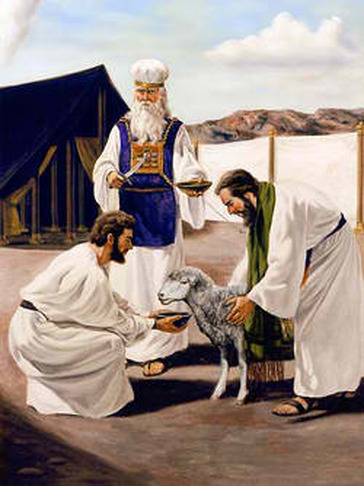After the Order of Melchizedek (Part 1)
By
James Scott Trimm
There have a lot of creative interpretations of just what a “Priest forever after the order of Melchizedek” is. But to get a good idea of what this phrase really means, lets begin by looking at it in the original Hebrew. Where the KJV has “after the order of Melchizedek” the actual Hebrew is:
עַל־דִּ֝בְרָתִ֗י מַלְכִּי־צֶֽדֶק
This phrase עַל־דִּ֝בְרָתִ֗י is a compound of two words על which is a preposition meaning “about, concerning, upon” and דברתי “word, speech, cause”.
What does this phrase mean?
According to the primary Jewish tradition, the “you” in Psalm 104:4 who is told “you are a priest forever after the order of Melchizedek” (Ps. 110:4) is Avraham, and the event refers to Gen. 14:18-20
Rashi comments on Ps. 110:4
you are a priest forever because of the speech of Malchizedek: From you will emerge the priesthood and the kingship that your children will inherit from Shem your progenitor, the priesthood and the kingship, which were given to him. דִבְרָתִי מלכי-צדק. The “yud” is superfluous, like (Lam. 1: 1): “the city that was once so populous (רבתי).” Because of the speech of Malchizedek, because of the command of Malchizedek. You are a priest, Heb. כהן. The word כהן bears the connotation of priesthood and rulership, as (II Sam. 8:18) : “and David’s sons were chief officers.”
This agrees with a tradition in the Midrash Rabbah:
AND SAID UNTO HIM: ABRAHAM; AND HE SAID: HERE AM I (ib.). R. Joshua said: On two occasions Moses compared himself to Abraham, and God answered him, Glorify not thyself in the presence of the king, and stand not in the place of great men (Prov. XXV, 6). Now Abraham said, HERE AM I-ready for priesthood, ready for kingship, and he attained priesthood and kingship. He attained priesthood, as it says, The Lord hath sworn, and will not repent: Thou art a priest for ever after the manner of Melchizedek (Ps. CX, 4); kingship: Thou art a mighty prince among us (Gen. XXIII, 5). (Midrash Rabbah Genesis 55:6)
R. Ishmael said: Abraham was a High Priest, as it says, The Lord hath sworn, and will not repent: Thou art a priest for ever after the manner of Melchizedek (Ps. CX, 4). (Midrash Rabbah Genesis 46:5)
And the Talmud:
R. Zechariah said on R. Ishmael’s authority: The Holy One, blessed be He, intended to bring forth the priesthood from Shem, as it is written, And he [sc. Melchizedek] was the priest of the most high God.(Gen. 14:18) But because he gave precedence in his blessing to Abraham over God, He brought it forth from Abraham; as it is written, And he blessed him and said. Blessed be Abram of the most high God, possessor of heaven and earth, and blessed be the most high God. (Gen. 14:19f) Said Abraham to him, ‘Is the blessing of a servant to be given precedence over that of his master?’ Straightway it [the priesthood] was given to Abraham, as it is written, The Lord said unto my Lord (i.e. Abraham see Ber. 7b), Sit thou at my right hand, until I make thine enemies thy footstool; (Ps. 110:1) which is followed by, The Lord hath sworn, and will not repent, Thou art a priest for ever, after the order of Melchizedek,’(Ps. 110:4) meaning, ‘because of the words of Melchizedek.’ Hence it is written, And he was a priest of the most High God, [implying that] he was a priest, but not his seed. (b.Nedarim 32b)
According to this tradition the priesthood diverted from Shem’s direct line, to Avraham because of Melchizedek’s words. The Talmud going so far as to indicate this was a penalty for Melchizedek’s words in Gen. 14:18-19.
Rabbi Abraham ben Meir Ibn Ezra (Hebrew: אַבְרָהָם אִבְּן עֶזְרָא or ראב”ע, also known as Abenezra or Aben Ezra, 1089–1167) was one of the most distinguished Jewish biblical commentators and philosophers of the Middle Ages. His is one of the classic commentators included in the Miqrat Gedolot. He writes in his commentary on Exodus. 19:6:
A Kingdom of Priests. In my opinion, “priest” in the Bible means “one who serves,” just as the verbal form is taken in 28:41 to mean “serve me as priests.” Jethro is the “priest of Midian” (18:1) because he served God, as did Melchizedek of Salem, the “priest of God Most High” (Gen. 14:18). The same is true when David’s sons are called “priests” in 2Sam. 8:18. There would be no point in telling us that they were “princes,” for we know that a king’s sons possess high rank; this verse informs us that they served God. So telling Israel that they will be “a kingdom of priests” means, “By means of you, My kingdom shall appear, when you are serving Me.” But others understand it to mean “There is no kingship other than serving Me.”
He seems to identify the priesthood “after the order of Melchizedek” with the general priesthood of the Assembly of Israel as a “kingdom of priests”:
And you shall be unto me a kingdom of priests, and an holy nation. These are the words which you shall speak unto the children of Israel.
(Ex. 19:6)
But you shall be named the Priests of YHWH: men shall call you the Ministers of our Elohim: ye shall eat the riches of the Gentiles, and in their glory shall you boast yourselves.
(Isaiah 61:6)
But you are a chosen generation, a royal priesthood, an holy nation, a peculiar people; that you should show forth the praises of him who has called you out of darkness into his marvelous light:
(1Kefa 2:9)
Following this interpretation, then, Abraham, and by extension, the Assembly of Israel are called a Priest forever after the order of Melchizedek, and then Psalms 110 can be applied as midrash to Messiah, because the Messiah and Israel have an allegorical relationship. (See my blog Out of Egypt I have Called My Son for a full understanding of this relationship).
In Part 2 I will dig even deeper into the SOD meaning of Psalm 110:4.
We are $150 short in clearing the bank tonight (Monday 8/22/22)!
As you know we have been digging ourselves out of a budget shortfall. As I have said to you many times, I look on this work as a co-operative one with me, and all of you combining our resources together in order to get the job done of helping to teach this great truth to all in the world who will listen. Thank you so much from the bottom of my heart for your continued support, you are the ones who make it all possible by your contributions and your prayers for our work. I truly appreciate your help in every way.
If you can make a one time donation of $500 or $1,000 dollars to support this work.
Donations can be sent by Paypal to donations@wnae.org
Or click HERE to donate










